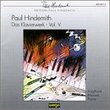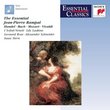| All Artists: Dmitry Shostakovich, Leonard Bernstein, New York Philharmonic Title: Shostakovich: Symphonies Nos. 1 & 6 (The Royal Edition, No. 76 of 100) Members Wishing: 1 Total Copies: 0 Label: Sony Release Date: 9/21/1993 Genre: Classical Styles: Historical Periods, Modern, 20th, & 21st Century, Symphonies Number of Discs: 1 SwapaCD Credits: 1 UPC: 074644761429 |
Search - Dmitry Shostakovich, Leonard Bernstein, New York Philharmonic :: Shostakovich: Symphonies Nos. 1 & 6 (The Royal Edition, No. 76 of 100)
 | Dmitry Shostakovich, Leonard Bernstein, New York Philharmonic Shostakovich: Symphonies Nos. 1 & 6 (The Royal Edition, No. 76 of 100) Genre: Classical
|
Larger Image |
CD DetailsSimilar CDs
|
CD ReviewsEngrossing David Saemann | 07/08/2008 (5 out of 5 stars) "Shostakovich was one of the formative influences on Bernstein both as composer and conductor. He conducted his works with an intimacy that was scarcely matched by other conductors. There were a number of works in Bernstein's repertoire that he took unusually slowly. Shostakovich's First Symphony was one of these works. It takes Bernstein 34 minutes to get through it, considerably longer than anyone else I can think of. Nevertheless, the interpretation works. In Bernstein's hands, Shostakovich sounds here like a Slavic Bruckner, slow paced and infinitely subtle. The performaance definitely is not a lark--it carries great conviction. For a more standard performance, I would recommend Martinon or Ormandy, but Bernstein's demands to be heard. His Symphony No. 6 is far less individual. It is beautifully played, and the tempos seem well thought out. The last movement is very exciting. Sound engineering in both works is clear and agreeable. This album is an insight into Bernstein as much as Shostakovich." A bitter, rather coarse Sym. #1, a sober, inward Sym. #6 Santa Fe Listener | Santa Fe, NM USA | 09/11/2005 (5 out of 5 stars) "Bernstein conducted Shostakovich better than anyone outside Russia (I wonder if someone holds that title for conducting American music outside the U.S.?) His later recordings for DG are a bit ponderous in their effort to dig out every bit of meaning from Shostakovich's idiom. But LB's earlier performances with the NY Phil. are just as personal.
This Sym. #1 is quirky, exposing more edge and bite than most conductors find in the score. Very little here is saucy or witty. Bernstien's view is already bitter, foreshadowing the persecuted Shostakovich rather than the show-off prodigy. The 1972 sonics are also edgy and hard, in fititng alliance with the reading. The 1965 recording of Sym. #6 sounds much more open and natural--it's one of the best that Bernstein's Shostakovich ever received. The opening Largo becomes a tragic outcry in Mravinsky's hands; no one else strikes quite that depth of emotion, including Bernstein, but he conducts it with solemn beauty, and the orchestra is at its best in producing haunting spare lines of melacholy reflection. Perhaps because the rollicking Scherzo is often criticized for sounding trivial by comparison, Bernstien takes it fairly slowly and draws deeper tone than usual. This allows him to gallop through the finale, but even here he reins in the high spirits. A sober air hangs over the entire work, which is quite valid. Of the two readings, I prefer this one to Sym. #1, but both are gripping and cnvincing." |

 Track Listings (8) - Disc #1
Track Listings (8) - Disc #1



